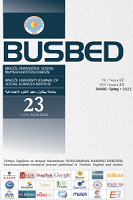XVI. YÜZYILDA CELÂLİLERE LOJİSTİK SAĞLAYAN SERBEST TIMARLAR
FREE TIMARS PROVIDING LOGISTICS TO JELALIS IN THE SIXTEENTH CENTURY
Author(s): Savaş YılmazSubject(s): Law, Constitution, Jurisprudence, Criminal Law, Criminology, 16th Century, 17th Century, The Ottoman Empire, Court case
Published by: Bingöl Üniversitesi Sosyal Bilimler Enstitüsü
Keywords: Imperial Court; Free Tımars; Sipahi; Peasant; Bandit;
Summary/Abstract: In the Ottoman, in the second half of the sixteenth century; The "Jelali Revolts" had gained intensity especially in villages. Bandit gangs, who emerged towards the later period of Suleiman the Magnificent, expedited the exploratory missions during the reign of Selim II, and their intensity increased as the Ottoman law code deteriorated during the period of Murat III, they increased their intensity with the deterioration of the supreme legal system, and in the period of Mehmet III, they turned their looting and plunder into depression with their lawlessness. The bandits, followed by the law enforcement, were able to escape each time by taking shelter in free tımars when they got stuck; thus, the tımar owners allowed them to become stronger. In addition, the fact that the mercenaries were bandits and knew military strategy and tactics fueled the fire of rebellion. In coping with bandits; The fact that the people skilled in the "art of war" and the unemployed (suhte) formed the human resource of bandits caused difficulties. Although there have been many studies on the Jelalis, the lack of an independent study on the place of "free tımars" in the development and exacerbation of banditry has necessitated the investigation of this subject. Since the decisions about the bandits taking shelter in free tımars in the imperial court were investigated, mühimme records were used as the main source.
Journal: Bingöl Üniversitesi Sosyal Bilimler Enstitüsü Dergisi (BUSBED)
- Issue Year: 12/2022
- Issue No: 23
- Page Range: 1-14
- Page Count: 14
- Language: Turkish

